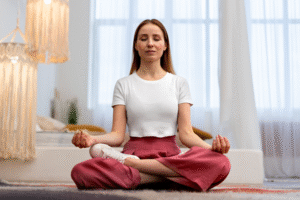
Image by Freepik
Shake the Dust Off: Seven Ways to Take Charge of Your Health by Gabriel Patel
You don’t need a personal trainer, a weeklong juice cleanse, or a stack of wellness books to start steering your own ship. Health isn’t a finish line, it’s the day-in-day-out. It’s the choices you make between the coffee and the commute, after dinner, before bed. You already know the doctor’s advice, the friend’s suggestions, the endless scroll of Instagram wellness routines. But there’s a quieter wisdom, the kind that comes from paying attention, tweaking a little, and sticking with it. You’re not reinventing your body, just reclaiming your authority over it. Here’s where that starts.
Move Your Body, On Purpose
You don’t have to love it, just do it. Dance in your living room, jog the block, drag the dog out, chase your kid. What matters is that you’re not still. The body is built for movement, and regular physical activity provides significant physical and mental health benefits that ripple out way beyond the gym. A good walk can clear a foggy head faster than caffeine. It’s less about six-pack abs, more about the heart, joints, lungs, and yes, even mood. Keep it consistent, keep it simple, and keep going.
Eat What Your Body’s Asking For
Ignore the food fads and marketing noise for a minute. Think instead about colors on your plate, ingredients you can pronounce, meals that leave you satisfied, not sluggish. The truth is a balanced diet supplies the nutrients your body needs to work effectively, and when you feed your body right, it responds. Less inflammation, better energy, clearer thinking, and fewer crashes by 3 p.m. You don’t need to count every calorie or cut every carb. Just get close to whole foods, and closer to what makes you feel full in the right way.
Sleep Is a Ritual, Not a Reward
This one? Non-negotiable. You can drink green smoothies till you float, but if your sleep is garbage, your day will be too. Sleep isn’t just rest, it’s repair, memory building, emotional cleanup. And sleep loves structure — same bedtime, same wind-down, less caffeine roulette after lunch. No screens an hour before bed isn’t a myth, it’s medicine. Your body will thank you in dreams and daylight.
Spend Some Time Meditating
The noise never really stops, but you can learn to listen differently. Meditation isn’t reserved for monks or mountain tops, and you don’t need candles, apps, or incense to start. Just sit, breathe, let things pass through instead of clinging to them. If you spend some time meditating, even just 10 to 20 minutes a day, you can reduce stress and give your brain a better shot at peace. It’s not about reaching zen, it’s about noticing when you’re not. And that noticing changes everything.
Get Ahead of Your Stress Before It Wins
Stress builds quietly, then it blindsides you. Bills, family, work, politics, that weird ache in your shoulder — they pile up fast. Instead of white-knuckling through it, learn how to disarm it before it explodes. There are healthy ways to cope with stress that don’t require disappearing into the woods or shouting into pillows (though, fair play if that helps). Think journaling, a quick walk, calling someone who gets it, or just saying no without guilt. Managing stress isn’t about removing pressure, it’s about building resilience under it.
Connection Is Your Secret Weapon
You’re not built to go it alone. Even the most introverted soul needs tethering to someone now and then. Laughing with friends, crying with family, even chatting with a stranger can be medicine. Studies show that social connection can help people live longer and healthier lives, and that’s no small detail. It’s easy to disappear behind texts and screens, but face-to-face moments matter more than most people admit. Schedule them, protect them, and don’t wait until you feel lonely to reach out.
Keep Your Checkups, Seriously
If something feels off, don’t Google your symptoms at 2 a.m., talk to a real doctor. Even when you feel fine, go anyway. Routine health check-ups play a vital role in detecting potential health issues in the early stages, long before they knock the wind out of your life. It’s not paranoia, it’s prevention. Those yearly visits aren’t just about cholesterol and blood pressure, they’re about you staying in the driver’s seat. Keep the appointment — it could save more than your time.
You don’t have to do it all today. Just do something. Health isn’t an extreme sport, it’s the background music to your life — steady, supportive, occasionally surprising. You tweak, test, learn, and move forward. Own your body like you own your decisions. Nobody else gets to do it for you, and frankly, nobody else can. Start where you are, and keep showing up. That’s how change starts to stick.
Explore cutting-edge research and insights on aging, mitochondrial dysfunction, and innovative therapeutic strategies at Michael Guth’s website to stay informed and inspired in the world of medical advancements.



 Posted in
Posted in